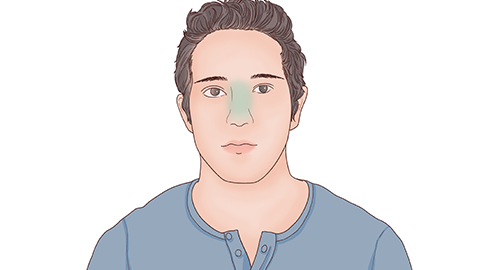What causes nosebleeds in boys?
Generally, nosebleeds in males may be caused by strenuous exercise, smoking irritation, vestibular rhinitis, sinusitis, hypertension, and other factors. If discomfort occurs, timely medical attention is recommended. Specific analysis is as follows:
1. Strenuous Exercise
Males often engage in strenuous activities such as basketball and running. During exercise, blood circulation accelerates, increasing pressure in the nasal blood vessels. If there is slight damage to the nasal mucosa, nosebleeds may occur suddenly during or after exercise. Warm up adequately before exercising, avoid nasal trauma during activity, and stop exercising immediately if a nosebleed occurs. Sit down, pinch both sides of the nostrils to apply pressure for hemostasis, and keep the head slightly forward. Maintain moderate exercise intensity and avoid excessive exertion.
2. Smoking Irritation
Some males have a smoking habit; harmful substances in cigarettes can irritate the nasal mucosa, causing dryness and congestion, increasing the fragility of underlying blood vessels, which can lead to nosebleeds. Symptoms such as nasal dryness and unpleasant odor may also occur. Quit smoking as soon as possible to reduce irritation to the nasal mucosa. If quitting smoking immediately is difficult, rinse the nasal cavity with normal saline after smoking to remove residual irritants. Drink plenty of warm water daily to keep the nasal mucosa moist.

3. Vestibular Rhinitis
Inflammation caused by bacterial infection of the nasal vestibule skin can lead to redness, swelling, and erosion, resulting in nosebleeds, often accompanied by pain and a burning sensation in the nasal vestibule. Frequent nose picking in males can trigger this condition. Stop picking the nose and follow medical advice for drug treatment, such as applying erythromycin ointment, mupirocin ointment, or fusidic acid cream to the nasal vestibule to inhibit bacterial infection. Keep the nasal vestibule clean and avoid exposure to contaminated water; gently wash the face.
4. Sinusitis
When the sinuses become inflamed, the inflammation spreads to the nasal cavity, causing nasal mucosal congestion and swelling, making blood vessels prone to rupture and bleeding. Symptoms such as purulent nasal discharge and headache may accompany. Males who do not receive timely treatment after catching a cold are prone to this condition. Follow medical advice for medication, such as cefixime dispersible tablets, mometasone furoate nasal spray, and eucalyptus oil soft capsules, to control inflammation. Rinse the nasal cavity with normal saline to expel secretions, reduce mucosal irritation, and avoid forceful nose-blowing.
5. Hypertension
Some adult males suffer from hypertension due to genetic and dietary factors. When blood pressure fluctuates, the pressure in nasal blood vessels suddenly increases, making them prone to rupture and bleeding. Nosebleeds in such cases are usually heavy and difficult to stop, possibly accompanied by symptoms such as dizziness and headache. Monitor blood pressure regularly and follow medical advice for antihypertensive medications, such as nifedipine sustained-release tablets, levamlodipine besylate tablets, and valsartan dispersible tablets, to maintain stable blood pressure. Keep emotions stable, avoid intense emotional fluctuations and excessive fatigue, maintain a light diet, and reduce salt intake.
In daily life, develop good living habits, ensure sufficient sleep, avoid staying up late, maintain a balanced diet, consume more vegetables and fruits rich in vitamins, pay attention to nasal hygiene, and adopt proper hemostatic methods when experiencing nosebleeds.









